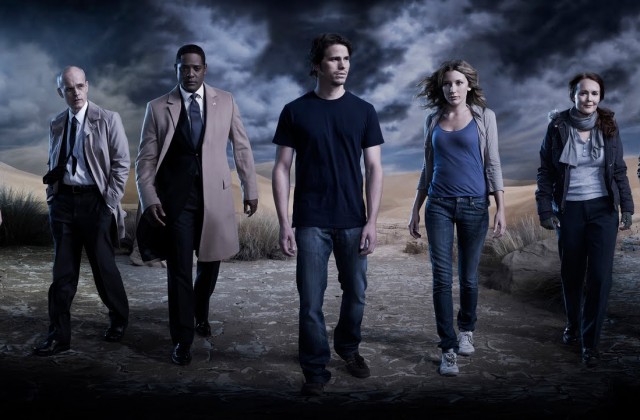One-season cliffhangers really, really suck

Few things about watching television suck as badly as a show that gets cancelled on a cliffhanger. But should showrunners have an obligation to bring new shows to a stopping point at season’s end?
For any fan of television, September is always an exciting time. The networks are rolling out their new slate; old favorites return – clearing up any cliffhangers – while new shows vie for the audience’s collective fandom. And as much as we fans might fall in love – or serious like – with a particular show, statistics show that most new shows won’t live to see a second season.
While we can argue the whys and what-fors of ratings vs. viewers, shares and the all-important “demo,” when it comes down to it, the people making these decisions are trying to maximize profits for their company. Despite what TV watchers might think, that’s not a bad thing; it’s really just the way of the world.
But while a couple two or three million viewers may not be enough to sustain a show into future seasons, that’s a lot of viewers that have allowed themselves to become invested into a show – or at least the beginnings of one. It’s bad enough for those fans when the network pulls the show before the first 13 episodes have aired; whats much worse is when we get to the end of those 13 — or even full run of 22 — episodes, and we’re left with a cliffhanger that has no hope of being resolved.
Crap. There’s actually no better word to describe how that feels. Personally, when that happens, I can conceptualize why the show’s no longer on the air. I get that something like Journeyman or Kings spoke to me, but didn’t have the popular appeal to warrant multiple seasons. That pretty much sucks, but it is as an inevitable occurrence, as the May up-fronts that signal in a new crop of shows for us to get attached to.
Sadly, showrunners do this to us all the time. Kings is probably one of the shows that stung me the most; David flees Gilboa and Silas’ wrath, while Michelle is sent away by her father to birth her child in secret. But that failed NBC drama is far from the only offender. Other shows have ended their first seasons with just as many questions: The Lone Gunman, The Event, John Doe, FlashForward, Surface, Invasion … this list could literally go on for pages and pages.
But for every Persons Unknown or My So Called Life, there’s a Chicago Code or the aforementioned Journeyman. When the first thirteen episodes of Shawn Ryan’s Chicago-set police drama came to a close, Teresa Colvin and Jarek Wysocki were slapping the cuffs on Alderman Ronin Gibbons. Journeyman may have not answered the question of what — or who — was causing Dan Vasser to go back in time, but the story came to a wonderful “resting point,” as his wife finally saw and believed his jump. Occasional Clacker Bob Sassone and I may have been the only ones on the planet who truly enjoyed Studio 60 on the Sunset Strip; I appreciated how all of the story lines came together in a nice, neat — though admittedly implausible — package. Even How I Met Your Mother had a plan in place — named Victoria — if the show didn’t get picked up past its original 13 episodes.
Those examples prove that it can be done. Talented showrunners can bring a story to a stopping point, even if it is far to quick to bring a story to a real close. Considering how savvy hard-core TV viewers are getting, it is in their best interest to keep fans — as few as a show might have — as happy as possible. Years ago, viewers might not have followed a showrunner like Shawn Ryan from The Shield to The Unit to The Chicago Code and Terriers, but today they will — the really smart ones will even tell how great his one season in charge of Lie to Me was. I’m a big fan of Ryan because of his work on those shows, and I feel that — after The Chicago Code — that I can trust him as well.
Admittedly, showrunners don’t have it easy. To keep their cast and crew working, they’ve got to please audiences and the networks. They have to create a commercially viable product that that’s born out of a craft so painstakingly developed. But I think the should challenge them; cliffhangers are a completely viable storytelling technique. But if the show is in any legitimate danger of being cancelled, keep your fans in mind when writing those finales!
 CliqueClack
CliqueClack








For me the best “oops we got pulled from the air” cliffhanger is Defying Gravity, it was pretty much perfection (also damn you whoever you “demo” people are for not watching it!!)
Flashforward’s didn’t affect me much because they had kind of tied up all the ends they just gave a new one “in case”.
One of the worst that has been grating on me was Mercy’s (and again, damn you stupid “demo”… ). “Hart of Dixie” was a close call as well…
But I think showrunners nowadays should always script their first season with the notion in mind that it’s going to get cancelled. Like you said, it’s just a sad fact of life nowadays that shows don’t get 2-3 seasons to find their footing anymore. They are lucky if they even get the whole 13 episodes (poor Pan-Am…)
The only problem with Defying Gravity’s ending is that ABC never got that far. Fans either had to “find” the video for the last couple episodes, or wait until the DVD collection.
Man, I loved that show
I take it you’ve read Keith’s post on his follow up interview with James Parriott?
Yeah I did! I was really happy he explained so much of what was going to happen. Of course it’s bittersweet knowing we are never going to see it…
I forgot they never even aired the final 2 episodes in US… that’s just sad, I can’t imagine anyone watching the last episode and not loving it.
I wonder why the show failed, wrong network? Wrong advertising for the wrong type of viewer? People thought it would be more action intense like a Star* series? Or people are unable to follow a non-episodic format unless it’s on cable?
While one man’s vague stopping point is another man’s frustrating cliff-hanger, there ought to be a ‘law’ that all shows must shoot that extra episode that allows them to substitute a finale or stopping point if they don’t get word in time from the executives on high that the show will be renewed. That’s something a network like NBC could use as a promotional to “come see our (admittedly, often crappy) on-going shows because if the show’s good enough to get to 13 or 22, we guarantee you either a next season or a satisfying stopping point.” The extra episode could always be tossed in as a dream episode some time in future years, a valued extra on the DVD set, or a $2.99 special on one of the internet re-broadcast services. Or all three.
And IF that all doesn’t work, how about a text article, novella, full-fledged book or a comic book series to tell we too-few devoted fans what was coming next. For instance, I would have liked to know what the Stargate: Universe creators had planned for Eli and the stasis-frozen crew of the ship in season 3. With apologies to dedicated fan creationists, I’d want to hear the plans from the creators. Joss Whedon has done extremely well in adapting his Buffy-verse to the comic format. It CAN work. And while it might be more difficult to go that route with say, Dallas, prose alternatives also work fine.
Networks should either hold to the social contract I’ve outlined above, or go to the dedicated mini-series format popular in most of the rest of the world, where any particular season’s set of episodes might be the last ever seen. The Elementary progenitor, Sherlock, over in Britain, could have ended after each of the two three-episode series shown so far. The late lamented Crime Traveller had two four-episode series and then never graced the airwaves again. Or you get a 50-year run like that enjoyed by Doctor Who. And isn’t The Bill somewhere around 30 now?
Cliff-hangers are cruel. They exist today to spur fans to appeal to networks for continued episodes. We pay enough in commercials, cable bills and our time already. We shouldn’t be slave lobbyists too.
I’m not sure that I agree with your final point, that cliffhangers only exist today to prompt fan appeals, because there are a lot of popular, non-in-danger shows that use them to great effect … many people don’t like the show, but Grey’s Anatomy does this particularly well.
But we both obviously agree that we wish we’d see more shows end with some level of closure.
Our editor Keith McDuffee has been real fortunate to set up a couple of interviews with the showrunners of Defying Gravity and Persons Unknown to get the low-down on what would have happened.
I was actually going to get him to reach out to the SGU showrunners for a similar type interview, but found that Joe Mallozzi had already written a blog that answers some — but not all — of the questions left open in the finale:
https://josephmallozzi.wordpress.com/2011/05/12/may-12-2011-stargate-universe-beyond-season-2-what-might-have-been/
Thanks very much for the link to Joe Mallozzi’s blog. Got the added benefit of reading about the non-existent sixth Atlantis season via a link there, too. It was a worthwhile few minutes.
As per your one disagreement with my comments, I will agree that I was too over-reaching with the blanket condemnation of cliff-hangers as rabble-rousing devices. I will amend it to, “Too many of them exist today …”
Appreciate your kind words and the effort you and your fellow writers put into this site. Thanks. GM
I’m totally annoyed with cliffhangers in general, not just for cancelled shows. “Warehouse 13″ is an excellent example. We’re only 10 episodes along and we’ve already hit the “mid-season finale” with yet another cliffhanger, and they didn’t even fully resolve the one from the end of last season.
Even when they DO resolve a cliffhanger, often it just wasn’t worth the wait for it. The “NCIS” season opener left me thinking “I waited all summer for THIS???”.
I’ll tell you what else I think of cliffhangers….. but it’s the mid-season finale for this post, and you’ll have to come back in April to see what I’m going to say!
May i had add that two-season cliffhangers sucks too.
Any reference to a certain “scary robot” show that i love is purely coincidental but if you want to read what showrunner Josh Friedman had to say about TSCC cancellation, read his article on his blog.
link : https://hucksblog.blogspot.fr/2009/06/boy-in-bubble.html